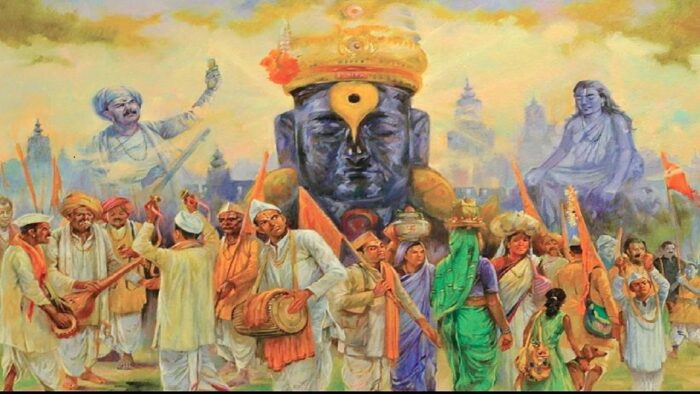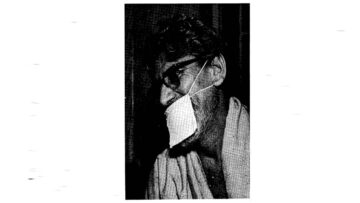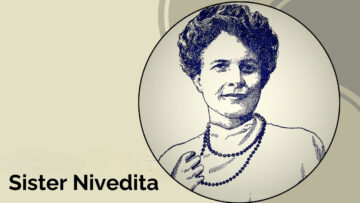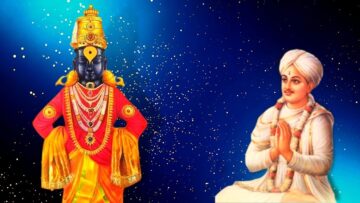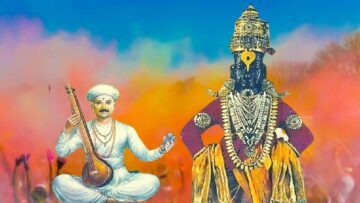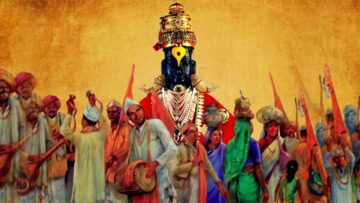Jaijyaji sadguru Swami Tukaya Datara
Tarak Tu sakallancha jivlaga Soyara
(Hail oh generous Sadguru Swami Tukaya
You are the beloved kin and savior of one and all.)
Warkari is a sampradaya or a religious movement within the bhakti movement tradition of the Hindu fold. The Warkaris worship Vithoba or Vitthal who is the presiding deity of Pandharpur. Prominent among the Marathi saints like Sant Dnyaneshwarji Maharaj, Sant Tukaram Maharaj and Sant Eknath Maharaj not only mobilized the masses together the nectar of Bhakti through their Abhangs (devotional poetry sung in the praise of Lord Vithoda) but were also responsible for social and cultural renaissance. The followers of this movment belonged to all castes and they condemned sacrifices in religious worship.
The month of Phalgun is very special for all Warkaris as it is associated with punya smaran of their revered Sants which serves to inspire, educate and lift us above our petty existences, to higher truths. Saguna Charitre Param Pavitre Sadar Varnavi – The lives of virtuous people should be extolled with respect.
In part 1 of the series on celebration of great warkari saints, we will briefly explore the life and astonishing Vaikuntha Gaman of one of the greatest sants Maharashtra has produced, Sant Tukaram Maharaj, which falls today. As we all know, his life and poetry is hailed all over India and particularly in Maharashtra, his land of birth.
Today, Twitiya of Krishna Paksha (waning phase of the moon) in the Phalgun month is Tukaram Beej. A time to pause and reflect on the life and message of a great revered beloved Sant of Maharashtra, Sant Tukaram Maharaj.
He belongs to the illustrious lineage of sants from Maharashtra who are all characterized by great pradnya (intellect), bhawnik buddhumatta (emotional intelligence) and ateev Karuna (deep compassion) for humanity and all pranimatra (creatures) in general. Each Sant of Maharashtra has some special unique qualities, but all of them share common attributes of deep compassion for humanity.
In the metaphor comparing the Warkari Sampradaya to a temple building, Sant Dnyaneshwar Maharaj is the foundation…..
‘ Dnyanadeve Rachila paya…..’ Dnyanadeva laid the foundation.
‘ Tuka zhallase Kallasa’.
Sant Tukaram is called the ‘Kallas’ (the highest point of the dome of a temple, considered as sacred as the murti in the temple).
The lives of each Sant reveals, how the Warkari Sampradaya founded by Sant Dnyaneshwar in the 12th century, accepted and endorsed living the life of a grihasta , but one who is steeped in spirituality and love of Shri Panduranga, the beloved God of the Warkaris and much of South India, considered to be an avatar of Shri Krishna.
Sant Tukaram’s life reflects the concerns and everyday problems of any common person and his daily struggles with life – whether boudhik (mental), arthik (financial), vaivahik (marital) samajik (social), etc.
The incidents in the lives of sants of Maharashtra are embedded in the psyche of any Marathi speaking person and especially a Warkari. For a Warkari the sants who were born in their lands, live with them in their humble homes. They are a witness to each happening, in their lives. An ovi or couplet from the vast Sant kavyas or Saint Poetry, always slips off the tongue, an anecdote from their edifying lives always ready to offer dilasa (comfort) and sahayya (succour) to a troubled householder.
Sansaar tape tapalo mi Deva (I am so beleaguered by life, of a householder)
Or
Antakalli taisa Sankatache weli Hari taya sambhali antar bahia (Hari will comfort and look after you in times of dukkha (sorrow) and when the end comes, if you have chanted His name always)
Or
Sansaar dukkha mulla chahukade ingall ( life is the cause of all sorrow and we are surrounded by burning embers)
All reflect the daily struggles and pains of a sansaari.
To return to the significance of this day let us to go back to some incidents or throw light on some aspects of Sant Tukaram Maharaj‘s life.
Born into the family of a trader, Sant Tukaram belonged to a well off and pious family. They fell on bad times. Sant Tukaram’s heart was not in business. His heart was full of bhakti for Shri Panduranga and he had no time for anything else. He did not desire any worldly possessions, though from all accounts they did not lack two square meals a day. It was the way he chose to live his life. But this did trouble his very loving but feisty wife. She desired the simple comforts of life for her children and she was very vocal about it.
He wanted to pursue his parmartha in peace and would therefore get up early and leave the house for a hill known as Bhandarya dongar a few miles away from his village and sit there to do his bhakti without disturbance. There he would be lost to the world, engrossed in naam smaran.
In spite of her resentment and rancor she was so devoted to him, that after tending to her children and home, she would walk all the way from their village and up the hill carrying his meals, regardless of the weather.
He wrote prolifically. He has written over 4000 abhangs mostly in Marathi but it is not known that he wrote in Hindi as well.
Though he was dearly loved and respected in his village and his fame had spread all over, he had his fair share of enemies too. There were those who were plainly jealous of his popularity and some brahmins, who thought that propagation of dharma and Kirtan were exclusively their preserve couldn’t accept his greatness easily.
Sant Tukaram Maharaj was in his fifties. Young by today’s standards when he felt that he had had enough of this world. Great souls decide when they want to take on the body or leave it. He felt perhaps that he had finished his avatar karya. Having swallowed much pain and anguish he did not wish to delay the inevitable.
Everytime he left for the Wari or pilgrimage to Pandharpur, he would go around asking his most devoted shishyas to accompany him. He had a special name for Pandharpur. He would call it Vaikuntha. With his Veena around his neck, singing bhajans he would go to each one’s house call out their names and invite them to accompany him to Pandharpur. This time too he did the same thing. Villagers were perplexed. This was not the usual time to visit Pandharpur. He would look back and say that he would not be around to ask them again and those closest to him felt a strange sense of foreboding when he said that, but did not fully comprehend what he was saying. Some of them hurried behind him and some made excuses. This time when leaving for ‘Vaikuntha’ he had asked his beloved ‘Avli’, his wife too to accompany him. ‘Will you come with me to Vaikuntha this time Avli ?’ She turned at him in surprise, because it was unusual for him to ask her to go with him. It was clear to all that she was as devoted to her family and home as he was to Shri Vitthal. ‘Are you crazy?’ She said in her rustic style. ‘My buffalo will deliver at any moment, there is so much to be done in the house, Holi is round the corner. How can I come?‘ She was also pregnant at that time. She was to give birth to Sant Narayan Maharaj later, who was a great and well known devotee of Shri Vitthal like his father before him. Knowing how devoted she was to him, Sant Tukaram warned her again that she might complain that he did not ask her and that she should give up her worldly attachments. She found his insistence unusual, but immersed as she was in her daily routine, didn’t have time dwell on his words.
And thus on this day of Beej, Sant Tukaram walked towards the river near his home town of Dehu and began the last Kirtan in this avatar. Wherever he performed his Kirtans crowds would collect within no time and that day was no exception. The shishyas who were particularly attached to him, had rushed behind him and he started with the beej mantra, Jai Jai Ram Krishna Hari. The bhajan rent the skies as he sang with more fervour than usual. The Kirtan proceeded with Sundar te dhyan and Vithoba Rakhumai. This was followed by the abhang of the day and then the chanting of Vitthal Vitthal before the second part or uttarardha began. The devotees were singing along with him. The naam ghosh was more poignant than ever and the skies were filled with Naad Brahma. Everyone present there, sang along eyes closed, hands clapping in tune, with their beloved Tuka. Present that day, were stalwarts and great saint devotees like Sant Nilobaray Maharaj, Rameshwar Pant and others. As the bhajan reached a crescendo, a moment came when they could not hear his voice. The voice in which their voices blended had seized. They started looking around, wondering if he had gone to answer a nature’s call but moments became hours and they could not see or hear their beloved Tuka. They searched all over in vain. They sat there and started the naam ghosh Tukaram, Tukaram, Tukaram Tukaram….but to no avail. He seemed to have disappeared. Disappeared from among them in this most mysterious, manner. It was something difficult for the prosaic mind to grasp. And then slowly it started dawning on them, that he had gone never to return in this most fantastical manner. The shock of his sudden disappearance left even the wisest among them bewildered and at a loss. They didn’t know whom to turn to and what to think or do. For a while there was total chaos.
Then they remembered his strange words to them that morning. The strange inflection to his tone and his perplexing demeanor. It all fell into place.
Strange and inexplicable are the lives of great people. They leave a mark not only on those they meet but on those born centuries after them. This passing away of Sant Tukaram, so sudden and so intriguing has made him larger than life. He said of himself, ‘Anurenu ya thokada, Tuka Akasha Evadha …’ (I am is as miniscule as the smallest particle and yet as vast as the sky).
All were still and silent. The rustic peasant, the farmer, the pandit, the trader, men, women and children in stunned silence. And then slowly the tears started to fall. Tears of despair and deep sorrow. Will they never see their beloved Tuka again? Will they ever hear his gentle voice again? Will, they ever feel his compassionate pat on their backs again? They were inconsolable. The one who was a comfort to all of them had gone. Now who would wipe their tears? ’ Tu guru bandhu pita , tujhi amuchi ishtadevata’, ( you are our teacher, our brother our father, you are our personal god. )they called out. For once he didn’t seem to hear.
This Vaikuntha Gaman of Tukaram Maharaj has perplexed many for centuries. There have been many skeptics and naysayers. They are welcome to their opinions. It doesn’t matter. This is what it was. This is the account written by many wise scholarly saints present at the place that day.
Prayan Kalli deve viman pathvile
Kalichya kalla majhi adbhut vartaville
Manav deha gheuni nijdhama gele
(‘At the time of his passing God sent an aerial carrier
And thus I narrate an astonishing happening in kalyug
He ascended to the other world, in his body state’. Says Nilobarai Maharaj)
It then occurred to some among those present, that poor Avli should be told the devastating news. When she reached there and realised that all was gone she dropped down in a faint. Her husband, her guru, her life had left her. She was inconsolable.
No one left the venue for two days. On the third day Tukaram Maharaj’s Veena and cymbals fell into their laps from the sky. It was a signal to them from their beloved Tuka, to stop mourning and continue doing what he had taught them. The message was clear. Do naam japa, live virtuous pious grihasthi lives and do not forget our beloved Vithu. Do your daily sadhana and sing His bhajans. Follow the path I have shown you. The sadhya and the sadhan is the same. Never forget.
This story of Sant Tukaram Maharaj‘s Vaikuntha Gaman doesn’t end here. There is a story which follows, equally poignant as this one which shall be narrated on the auspicious day of Rang Panchami which falls on the 22nd March this year.
To be continued..
Feature Image Credit: facebook.com
Disclaimer: The opinions expressed in this article belong to the author. Indic Today is neither responsible nor liable for the accuracy, completeness, suitability, or validity of any information in the article.

